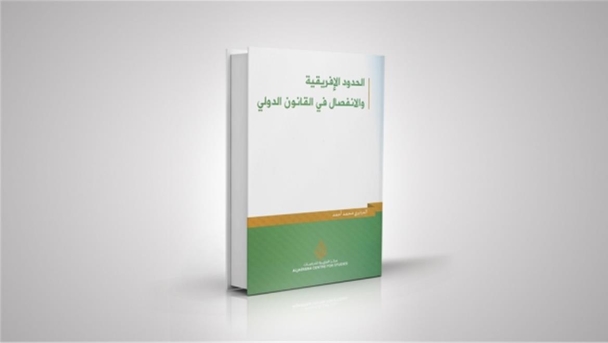
African Borders and Secession in International Law, published by Al Jazeera Centre for Studies in April 2017, looks at the issue of secession in postcolonial African states. The African continent even today continues to cope with the impact and repercussions of colonialism, which bequeathed civil wars and armed conflicts in several states and regions, such as Eritrea and South Sudan. This explains why all African states find the very idea of secession abhorrent and resist it wholesale. The book poses a central question: what is the origin of the collective African commitment to the rejection of secession? What is the legal basis for the retention of existing borders?
In an attempt to answer these questions, Dr. Dirdeiry Mohammed Ahmed
explains in the first chapter of the book the basis for the emergence of the African regional order and how it was constituted, looking at its distinguishing characteristics. He shows that the decision of African states to respect existing, inherited borders became a new normative rule absent a binding legal obligation. In addition, the Cairo Declaration, released during the meeting of heads of state of the Organisation of African Unity in its first session on 17–21 July 1964, led to the development of an international practice of respecting and sustaining the territorial situation as its existed at independence. This later evolved as the rule of the status quo, which preserved the border arrangements left behind by colonial regimes. As a result, a customary order emerged in Africa that substantially changed how international law was applied in the continent. In particular, this order prohibited the redrawing of African borders and secession, turning these two customs into incontrovertible, binding legal principles.
Although the African regional order is quite robust, as the author observes, and enjoys the profound esteem of all African states, it was not recognised judicially. In fact, the International Court of Justice (ICJ) denied this order in the case of the border dispute between Burkina Faso and Mali, ruling out the possibility of an African norm gradually evolving within international law. The ICJ said that with independence Africa had adopted the principle of uti possidetis (“as you possess”), derived from the Spanish empire in the Americas, and applied it to the continent. The court disregarded the normative value of the Cairo Declaration, considering it merely an illustrative document affirming uti possidetis. This chapter shows the ICJ’s major error, explaining the difference between uti possidetis and African customary rules and examining the various legal implications of the application of these rules and their fundamental divergence from the implications of uti possidetis.
While the first chapter is devoted to detailing alternative legal rules created by Africa to regulate its territory and borders, the second chapter turns to the prohibition of secession on the continent. It demonstrates how the African rule barring secession resulted from the perpetuation of independence borders and the regional status quo. Because of this central rule, secessionist demands are not publicly made in Africa and African states cannot explicitly recognise them. To avoid the steep political cost of publicly calling for secession, separatists in Africa make a show of respecting this African norm, advancing alternative claims in the hope that they resonate with the African Union or the home state. Some of them claim they are seeking to revive an old right to a referendum on liberation from colonialism, as was seen in Eritrea, while others claim a constitutional right of self-determination, as was the case with South Sudan. Some work for corrective secession, claiming a denial of their right to government representation, as was said in the case of Katanga. This misrepresentation has distorted the African state order and complicated secession on the continent, making it difficult to understand and resolve.
To confront this predicament, the author ponders the possibility of cautiously developing a new right of external self-determination that would include secession. If self-determination is conventionally limited to liberation from a colonial power or military occupation, an updated version should be affirmed to enable international law to deal with instances of dominance within multi-ethnic independent states.
The book notes that despite the gains made thanks to the ban on secession in Africa, and despite the usefulness and importance of retaining the general African rule against secession, international law must recognise an exception to this rule that upholds the right of equitable secession as merited in cases of societal hegemony. Such an exception would strengthen respect for the parity of different ethnicities in the multi-ethnic independent state and represent the final refuge if one ethnicity is subject to the dominance of another. It would also address the flaws exposed in the African regional order over the past 50 years and pave the way for a new era in which the value of the human being and human dignity is elevated above considerations of territorial sovereignty and integrity.
Publication details
Title: African Borders and Secession in International Law
Author: Dirdeiry Mohammed Ahmed
Publisher: Al Jazeera Centre for Studies and al-Dar al-Arabi lil-Ulum
Date: 2017